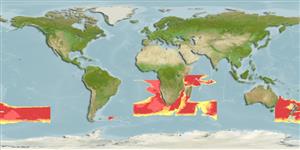>
Gadiformes (Cods) >
Macrouridae (Grenadiers or rattails)
Etymology: Haplomacrourus: Greek, haploos = single + Greek, makros = big + Greek, oura = tail (Ref. 45335).
Environment: milieu / climate zone / depth range / distribution range
ນິເວດວິທະຍາ
ສັດທະເລ ກ່ຽວກັບ (ຢູ່) ຊັ້ນນ້ຳໃນທະເລເປີດທີ່ປອດແສງສ່ອງເຖິງ; ລະດັບຄວາມເລິກ 690 - 1590 m (Ref. 11953). Deep-water
Southern Atlantic, Indian and Pacific: Southeast Atlantic. Indian Ocean: off Natal, Walters Shoal, Mascarene Ridge, Broken Ridge, southeastern coast of Australia. Southwest Pacific: off New Zealand.
ຂະໜາດ / ນ້ຳໜັກ / Age
Maturity: Lm ? range ? - ? cm
Max length : 57.5 cm TL ຕົວຜູ້/ບໍ່ມີເພດ; (Ref. 11953)
A benthic species found on the continental slope (Ref. 75154).
Life cycle and mating behavior
Maturities | ການສືບພັນ | Spawnings | Egg(s) | Fecundities | ຕົວອ່ອນ
Iwamoto, T. and E. Anderson, 1994. Review of the grenadiers (Teleostei: Gadiformes) of southern Africa, with descriptions of four new species. Ichthyol. Bull. J.L.B. Smith Inst. Ichthyol. (61):1-28. (Ref. 11953)
IUCN Red List Status (Ref. 130435)
Threat to humans
Harmless
Human uses
ເຄື່ອງມື
Special reports
Download XML
ແຫຼ່ງອີນເຕີເນັດ
Estimates based on models
Preferred temperature (Ref.
123201): 2.2 - 7.3, mean 5.4 °C (based on 223 cells).
Phylogenetic diversity index (Ref.
82804): PD
50 = 1.0000 [Uniqueness, from 0.5 = low to 2.0 = high].
Bayesian length-weight: a=0.00575 (0.00195 - 0.01700), b=3.08 (2.83 - 3.33), in cm total length, based on LWR estimates for this (Sub)family-body shape (Ref.
93245).
ຊັ້ນເຂດຮ້ອນ (Ref.
69278): 3.6 ±0.5 se; based on size and trophs of closest relatives
ຄວາມຢືດຢຸ່ນ (Ref.
120179): ຕຳ່ຫຼາຍ, ປະຊາກອນຕຳ່ສຸດທີ່ໃຊ້ເວລາສອງເທົ່າຫຼາຍກວ່າ 14 ປີ (Preliminary K or Fecundity.).
Fishing Vulnerability (Ref.
59153): Moderate vulnerability (43 of 100).
